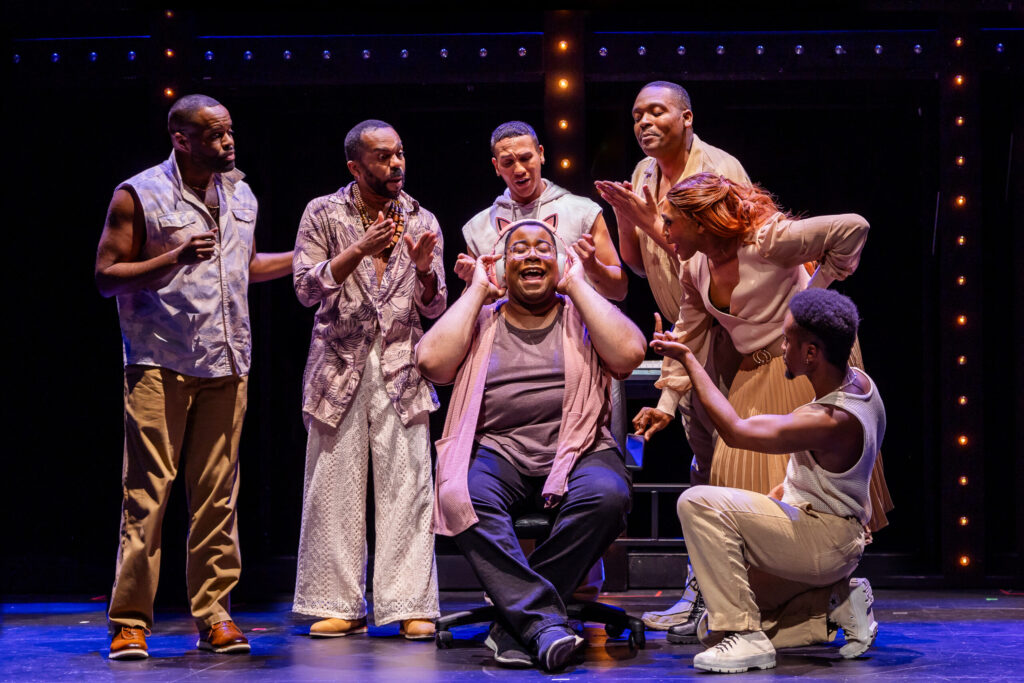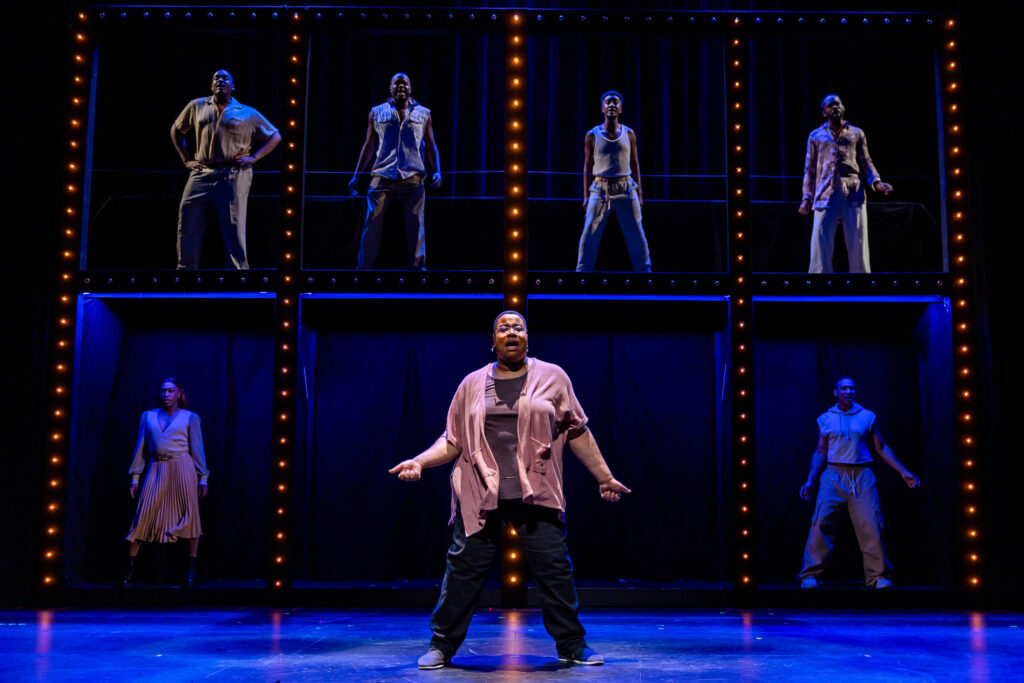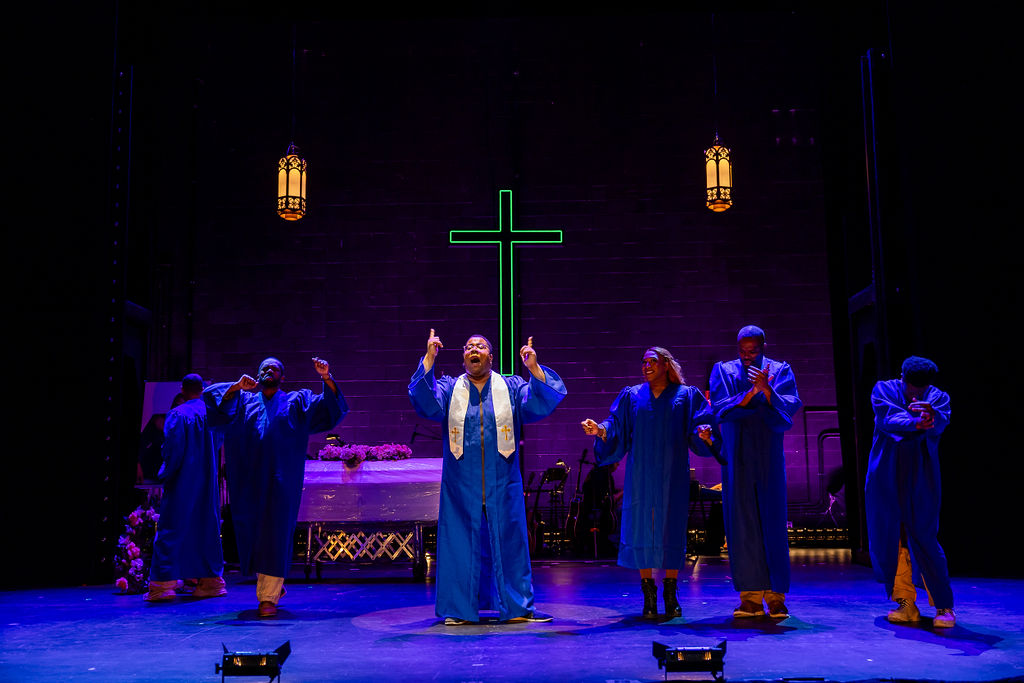
‘A Strange Loop’ — Book, Music and Lyrics by Michael R. Jackson. Directed by Maurice Emmanuel Parent. Music Direction by David Freeman Coleman. Choreographed by Taavon Gamble. Co-produced by SpeakEasy Stage and Front Porch Arts Collective at the Calderwood Pavilion, 527 Tremont Street, through May 25.
By Shelley A. Sackett
Playwright Michael R. Jackson, a heavy-set Black queer man, has brought the concept of sharing to a new level in his Pulitzer Prize and Tony Award-winning musical, “A Strange Loop.” The compulsively introspective show, which runs at 100 intermission-less minutes, spelunks into the deepest crevices of the anguished mind of its hero, Usher, a fat, Black, queer man writing a musical called “A Strange Loop” about a fat, Black queer man who’s writing a musical about a fat Black queer man.
It’s a crawl through a wormhole rigged with armed psychological and emotional IEDs, self-loathing, and regrets. It’s also a raucous and playful musical, full of humor, harmony, colorful characters, and even more colorful (potty) language.
The play opens on Jon Savage’s effective, slick set of six cubes lit in Broadway blue neon. (The only guidance Jackson’s script offers is to describe the setting as “A loop within a loop within a loop inside a perception of one man’s reality.”) Characters meant to represent Usher’s thoughts stand inside each cube. They dance. They sing. The effect is a cross between “Shindig” and “Hollywood Squares.”
We meet Usher (Kai Clifton) as the Thoughts dress him in his professional usher’s uniform. Usher works to make money in a theater where “The Lion King” reigns while he tries to write his play, a “big, Black, queer-ass, American Broadway show.” As he externally prepares to deal with the patrons who will soon flood the theater’s aisles, his mind is busy writing his play. He eagerly shares this work-in-progress with the audience.

“A Strange Loop” will have black shit! All thoughts. And white shit! It’ll give you uptown and downtown! With truth-telling and butt-fucking! There will be butt-fucking!” he belts out with gleeful forewarning.
It’s as if Jackson and Usher want to tip off their audience, “This ain’t no Disney musical, and make no mistake, we aim to deliver,” which they do, especially on the last item.
Usher leads a complicated inner life. His mind is a six-lane highway where Thoughts criticize, intimidate, denigrate, and insult his every move. Every time he resolves to dig himself out of his miserable routine, his thoughts disrupt and derail his plans.
The supporting cast of Thoughts #1-6, donning eye-catching costumes (Becca Jewett), are a vicious gang representing Usher’s agent (Fairweather), his inner cynic (Your Daily Self Loathing) and a host of other unhelpful characters, most notably Mom and Dad.
Through these inner/outer conversations between Usher and himself, Usher reveals his quest to peel back the layers of labels (Black, queer, etc.) and discover who he really is. We learn about all the issues he struggles with, including family pressures to ditch his sexual and professional preferences and embrace the Lord and style of Tyler Perry’s gospel melodramas; trying to figure out what it means to be a Black playwright writing a Black play; and struggling with what today’s world requires if one is to be “Black enough” and “gay enough.”
He also is coping with the bull’s eye homophobia, fatphobia, racism, and a white theater industry painted on his back.
All this should (and does) sound heartbreaking and overbearing. Yet, Jackson manages to pull off a musical that infuses humor and sincerity into a story replete with sadness, desolation, and rejection.
Through seventeen songs, Jackson’s lyrics tell a multilayered story of Usher’s angst-ridden life.
He longs for the unhampered freedom white girls have, yet also feels obligated to fulfill Black boy stereotypes (“Inner White Girl”). His doctor tells him he’s not gay enough because he’s only having sex once a year, but when Usher starts using dating apps, the result is predictably humiliating. He meets an engaging, flirtatious stranger only to discover he is a figment of his imagination.
The list of disappointments and rejections grows longer. His mother calls him on his birthday to remind him homosexuality is a sin, and his father asks if he’s contracted AIDS yet.
The best scenes, dramatically and musically, are those that have anything to do with Gospel music. When Usher’s agent tells him Tyler Perry is looking for a ghostwriter for his next gospel play, Usher turns up his nose in disgust. His Thoughts accuse him of being a “race traitor,” and in a hilarious scene, historical Black figures persuade him to take the job (“Tyler Perry Writes Real Life”). The full replication of a Tyler Perry set and lyrics that skewer Usher’s parents and parody Tyler (“Precious Little Dream/AIDS Is God’s Punishment”) are a welcome break. The actors’ voices (especially Clifton’s) awaken and strut their range and vibrancy. The lyrics are edgy and funny, the tune snappy and toe-tapping.

With the exception of distracting and annoying technical problems with the sound mixing (the actors’ voices were frequently not mic’d) and muffled lyrics, the production is effective, from Maurice Emmanuel Parent’s thoughtful direction to David Freeman Coleman’s music direction and conducting. The six Thoughts shine individually and blend seamlessly as an ensemble.
But it is Clifton as Usher who literally carries the weight of the show, and he is more than up to the task. Despite the temptation to wash our hands in frustration with this character who can’t seem to get out of his own way, his unfortunate circumstances notwithstanding), Clifton brings an underlying earnestness and likeability that make it impossible to abandon him. Plus, Clifton lets loose a powerful set of pipes during certain numbers (notably the gospel songs).
It’s hard to understand Jackson’s real purpose in writing “A Strange Loop.” It takes its title from a Liz Pfair song and from Douglas Hofstadter’s scientific concept that when a person only moves up or down, they’ll end up where they started. In other words, no matter how far or fast they think they’re going, they are essentially marching in place.
Jackson, now 43, said that although his play is not formally autobiographical, he began writing it as a monologue in his early 20s when he was experiencing himself as “nothing more than a mass of undesirable fat, Black gay molecules floating in space without purpose.”

He wrote Usher as a 26-year-old under unimaginable pressure. He is full of self-doubt and self-loathing, yet compulsively writes about himself in the belief it will magically change him. The more he plumbs his inner self, the more guilt and shame he dredges up. If writing “A Strange Loop” was meant to be Usher’s psychological catharsis, it misses its mark.
After all, Usher’s closing words are:
“Someone whose self-perception is based upon a lie,
Someone whose only problem is with the pronoun “I.”
Maybe I don’t need changing
Maybe I should regroup
’Cause change is just an illusion.
If thoughts are just an illusion, then what a strange, strange loop.”
And maybe that is Jackson’s point, after all. Inside his endless, strange loop of destructive thoughts and desperate hope that he can change who he is, Usher is his own worst enemy. Not only does he see himself as a failure, he assumes that everyone sees him as he sees himself.
His illusions are negative delusions.
It takes someone outside the loop—an impartial audience, for example—to appreciate that underneath this angsty, meek gay Black man beats the heart of a brave, creative person full of caustic wit and laser-sharp insight. We can only hope that Usher and all those suffering as he does can jump off the treadmill of self-doubt and fear, take a deep cleansing breath, and learn to love and accept themselves.
For more information and tickets, visit https://speakeasystage.com/

